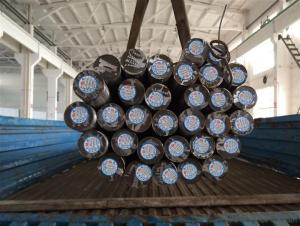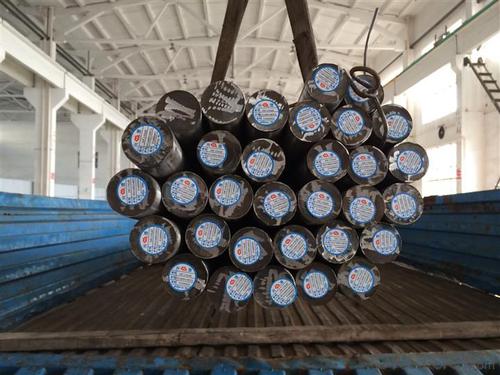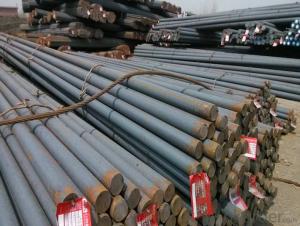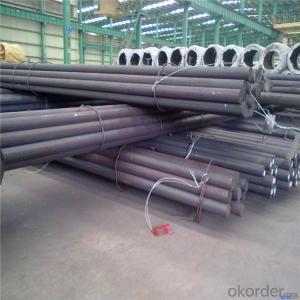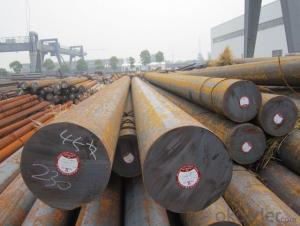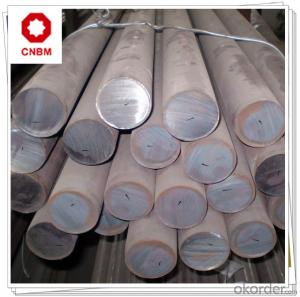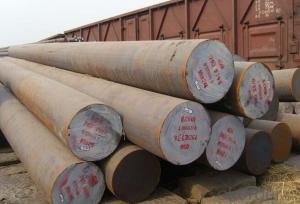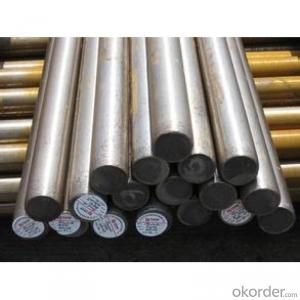Special Steel Carbon Steel Round Bar JIS S10C
- Loading Port:
- China main port
- Payment Terms:
- TT OR LC
- Min Order Qty:
- 30 m.t.
- Supply Capability:
- 10000 m.t./month
OKorder Service Pledge
OKorder Financial Service
You Might Also Like
Specification
Product Information
1 Grade Comparison:
GB | ASTM | JIS | DIN |
10# | SAE1010/AISI1010 | S10C | C10 (1.0214) |
2 Chemical Composition:
C | Si | Mn | P | S | Cr | Ni | Cu |
0.08-0.13 | 0.15-0.35 | 0.30-0.60 | ≤0.03 | ≤0.03 | ≤0.20 | ≤0.25 | ≤0.25 |
3 Brief Introduction:
Dimension | 13-350mm |
Length | 2-13m or as per your request |
Delivery condition | Hot rolled |
Heat Treatment | Normalizing, Annealing, Quenching |
Packing | Standard seaworthy packing or according to your requirements |
4 Mechanical Property:
Yield Strength (MPa) | ≥205 |
Tensile Strength (MPa) | ≥335 |
Elongation (%) | ≥31 |
Hardness (HB) | ≤137 |
Reduction in Area (%) | ≥55 |
Product Show
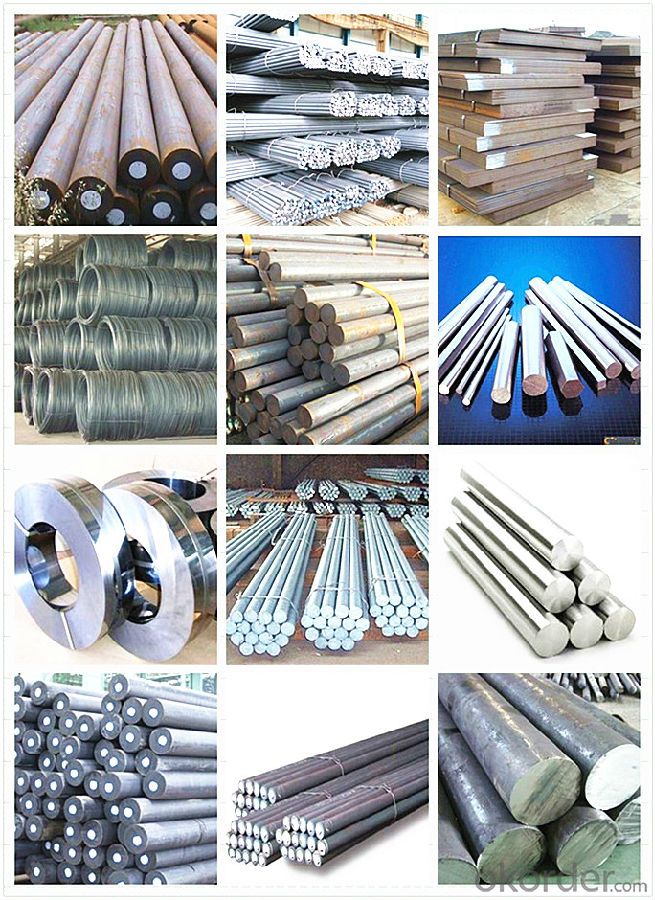
Workshop Show
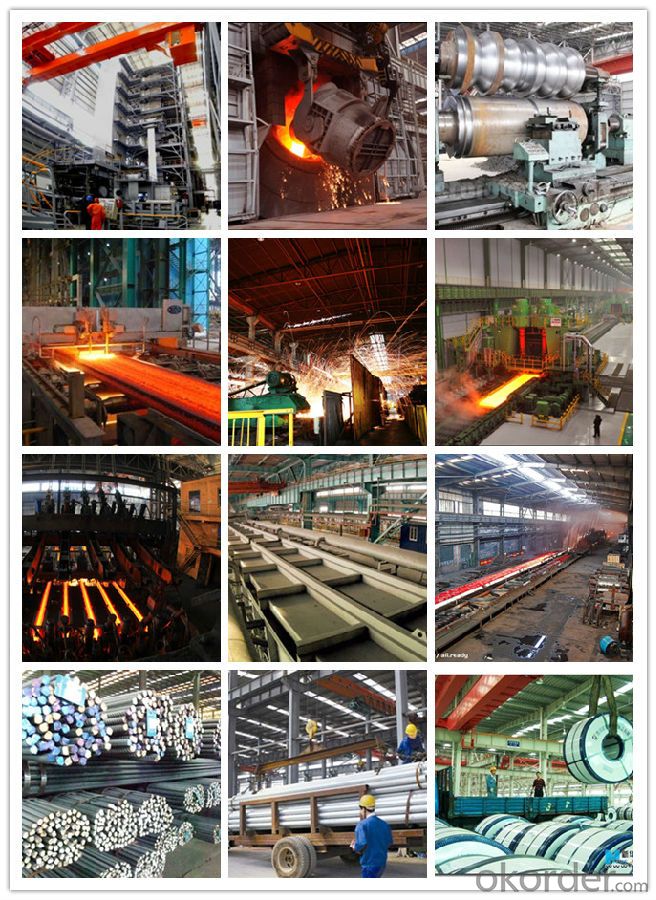
Shipping
1. FedEx/DHL/UPS/TNT for samples, Door-to-Door;
2. By Air or by Sea for batch goods, for FCL; Airport/ Port receiving;
3. Customers specifying freight forwarders or negotiable shipping methods!
Delivery Time: 3-7 days for samples; 5-25 days for batch goods.
Payment Terms
1.Payment: T/T, L/C, Western Union, MoneyGram,PayPal; 30% deposits; 70% balance before delivery.
2.MOQ: 1pcs
3.Warranty : 3 years
4.Package Informations: 1) EXPORT, In 20 feet (GW 25 ton) or 40 feet Container (GW 25 ton)
2)as customer's requirement
Why choose us?
(1) The leading exporter in China special steel industry.
(2) Large stocks for various sizes, fast delivery date.
(3) Good business relationship with China famous factories.
(4) More than 7 years steel exporting experience.
(5) Good after-sales service guarantee.
- Q: What are the emerging trends in the special steel industry?
- Some emerging trends in the special steel industry include the increasing demand for high-strength and lightweight materials, the growing adoption of advanced manufacturing technologies such as 3D printing, the focus on sustainability and environmental impact reduction, and the rise of electric vehicles driving the need for specialized steel grades. Additionally, there is a shift towards customization and tailored solutions to meet specific industry requirements.
- Q: Can special steel be used in the construction equipment manufacturing industry?
- Yes, special steel can be used in the construction equipment manufacturing industry. Special steel, such as high-strength or wear-resistant steel, can provide enhanced durability and performance to construction equipment, making it suitable for demanding applications in the industry.
- Q: How does special steel contribute to the oil and gas industry?
- Special steel plays a vital role in the oil and gas industry by providing the necessary strength, durability, and corrosion resistance required for various applications. It is used in the construction of pipelines, drilling equipment, wellhead components, and offshore platforms. The unique properties of special steel enable it to withstand high pressures, extreme temperatures, and harsh environments, ensuring the safety and efficiency of oil and gas operations.
- Q: What are the properties of wear-resistant tool steel?
- Wear-resistant tool steel typically possesses high hardness and excellent toughness, allowing it to withstand abrasion, impact, and deformation. It also has good heat resistance, retaining its strength and hardness at elevated temperatures. Additionally, wear-resistant tool steel exhibits good dimensional stability and corrosion resistance, making it a durable and long-lasting material for cutting, forming, and shaping tools.
- Q: How is special steel recycled?
- Special steel is typically recycled through a process called electric arc furnace (EAF) steelmaking. In this process, scrap steel is collected and melted down in an electric arc furnace, where high temperatures are used to separate impurities. Once the impurities are removed, the molten steel is then refined and cast into new forms to create various specialized steel products, ensuring that the steel is effectively recycled and reused.
- Q: Can special steel be used in the production of hydraulic components?
- Yes, special steel can be used in the production of hydraulic components. Special steel possesses superior strength, corrosion resistance, and durability properties, making it suitable for applications in the hydraulic industry. Special steel can withstand high pressure, extreme temperatures, and abrasive environments, ensuring reliable and efficient operation of hydraulic systems.
- Q: What are the different methods for controlling the grain size in special steel?
- There are several methods for controlling the grain size in special steel. 1. Heat treatment: One common method is heat treatment, which involves subjecting the steel to specific temperatures and cooling rates. This process can be used to refine the grain size by controlling the rate of nucleation and growth of new grains. For example, slow cooling can promote the formation of larger grains, while rapid cooling can result in smaller grain sizes. 2. Alloying elements: Adding certain alloying elements to the steel can also influence the grain size. For instance, elements like vanadium, niobium, and titanium can form carbides, which act as nucleation sites, leading to finer grain sizes. On the other hand, elements like aluminum and silicon can promote the formation of larger grains. 3. Mechanical deformation: Applying mechanical deformation to the steel, such as through rolling or forging, can also affect the grain size. These processes cause grain refinement by breaking up larger grains into smaller ones. Additionally, severe plastic deformation techniques like equal-channel angular pressing can produce ultrafine grains in special steel. 4. Grain growth inhibitors: Certain elements can act as grain growth inhibitors, preventing the coarsening of grain size during heat treatment. Examples of such elements include boron and zirconium. By controlling the concentration of these inhibitors, it is possible to inhibit grain growth and maintain a desired grain size. 5. Controlled cooling: Controlling the cooling rate during solidification and heat treatment is another method for controlling grain size. By carefully controlling the cooling rate, it is possible to achieve a specific grain size or a desired distribution of grain sizes. It is important to note that the choice of method for controlling grain size in special steel depends on the specific application and desired properties of the steel. Different methods may be employed in combination to achieve the desired grain size and optimize the performance of the steel for its intended use.
- Q: What are the different methods of heat treatment for special steel?
- There are several different methods of heat treatment for special steel, including annealing, normalizing, quenching, tempering, and case hardening. Each method involves heating the steel to a specific temperature and then cooling it in a controlled manner to achieve desired properties such as improved strength, hardness, toughness, or resistance to wear.
- Q: What are the different methods of surface cleaning for special steel?
- Special steel can be cleaned using various methods, each with its own benefits and uses. Some commonly used methods include: 1. Mechanical Cleaning: To eliminate dirt, rust, or other impurities from the steel surface, mechanical tools like wire brushes, sandpaper, or abrasive pads are employed. This method is effective for light to moderate contamination and is often used as a preliminary step before other cleaning methods. 2. Chemical Cleaning: Specific chemicals or cleaning agents are used to dissolve or loosen contaminants on the special steel surface. These chemicals can be applied by brushing, spraying, or immersion. Acid-based cleaners are commonly used for removing scale, rust, or oxide deposits, while alkaline cleaners are effective for eliminating oils, greases, or organic residues. 3. Electrochemical Cleaning: Electrochemical reactions are utilized to eliminate surface contaminants from special steel. This method involves applying an electric current and an electrolyte solution to dissolve or dislodge dirt, rust, or other deposits. It is particularly useful for cleaning intricate or hard-to-reach areas on the steel surface. 4. Ultrasonic Cleaning: High-frequency sound waves in a liquid medium are used to agitate and remove contaminants from the special steel surface. This method is highly effective for eliminating fine particles, oils, greases, or other organic residues from complex or delicate surfaces. 5. High-pressure Water Jetting: A concentrated stream of pressurized water is employed to remove contaminants from the special steel surface. This method is particularly useful for eliminating heavy deposits, coatings, or paints from large areas. The pressure levels can be adjusted to accommodate different degrees of surface contamination. It is important to consider factors such as the type and extent of contamination, the condition of the steel surface, the desired level of cleanliness, and the specific requirements of the application when choosing a surface cleaning method for special steel. Consulting with experts or professionals in the field is recommended to determine the most suitable method for a given situation.
- Q: What are the different standards and specifications for special steel?
- There are several standards and specifications for special steel, which vary depending on the specific type and application of the steel. Some common standards include AISI (American Iron and Steel Institute), ASTM (American Society for Testing and Materials), EN (European Norm), and JIS (Japanese Industrial Standards). These standards define the chemical composition, mechanical properties, and manufacturing processes required for special steel to meet certain quality and performance standards. Additionally, there may be specific specifications for different industries or applications, such as aerospace, automotive, or construction, that further define the requirements for special steel.
Send your message to us
Special Steel Carbon Steel Round Bar JIS S10C
- Loading Port:
- China main port
- Payment Terms:
- TT OR LC
- Min Order Qty:
- 30 m.t.
- Supply Capability:
- 10000 m.t./month
OKorder Service Pledge
OKorder Financial Service
Similar products
Hot products
Hot Searches
Related keywords
